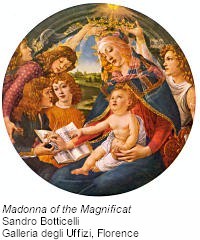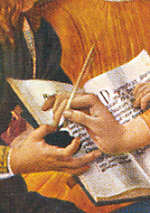Inkwell as Artistic Motif
Our Lady with the Inkwell
The Inkwell as an Artistic Motif
– Answered by Father Johann Roten, S.M.
Q: Can you tell me more about Our Lady with the inkwell?
A: Our Lady with the inkwell is a fairly well known iconographical motif, in particular in Flemish, French, Italian and Spanish art of the fourteenth century. The motif is part of the various representations describing Jesus growth and education, for example, nursing, Jesus' first steps, reading lessons, etc. In the theme of the inkwell Jesus learns how to write: fatigued, he falls asleep (Louvre, South-west school, ca 1400); or he accomplishes two activities simultaneously: nursing and writing (ivory, Davillier Collection. Louvre).

What does Jesus write? Some authors think of passages of Scripture such as: Discite a me quia mitis sum et humilis corde. Other explanations suggest that ink, inkwell and pen are used to inscribe the predestined ones in the book sealed with seven seals, using as reference the wellknown expression of Revelations: Non intrabit in eam (Jerusalem), nisi qui scripti sunt in liber vitae Agni. The names of the elect could have been members of a religious order or a confraternity (Antependium, Kunsthist. Museum Vienna).

Additional resource: M. Vloberg, La Vierge et l'Enfant dans l'art français, vol. II, 1939, pp. 31-35.
All About Mary includes a variety of content, much of which reflects the expertise, interpretations and opinions of the individual authors and not necessarily of the Marian Library or the University of Dayton. Please share feedback or suggestions with marianlibrary@udayton.edu.
